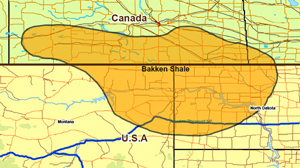Case in point is an article published in the Glendive Ranger-Review in an item entitled "Area sees record number of job listings." (May 3, 2012 issue, third item down.) A few highlights:
-- 200 job listings at Job Service, compared to a historical average of 100-120.
-- Basically nobody to apply for most of those jobs.
-- A severe housing shortage in Glendive means that housing prices have been driven up beyond what can be supported by many of the non-oilfield jobs that are available, leading Job Service to tell prospective employees to not to come to Glendive looking for work until they have an interview (and by implication, have non-existent housing lined up.)
-- "At a recent Dawson County Economic Development Council meeting, executive director Amy Deines said she has received phone calls from major retailers and others asking about the availability of labor." In other words, businesses want to come to town, but can't.
-- Even though there is a housing shortage, there are no job postings for construction workers (this feels like a big red flag, but what exactly does it mean?)
-- Some employers are considering following the lead of WalMart in Williston, ND and hiring foreign workers on H-2B visas (although there is no mention in the article of where these foreign workers would live.)
Read the entire article to get a taste of what things are like on the ground in Eastern Montana. Not only is Montana not exploiting the economic opportunities available, we are losing ground because of a lack of housing. Note that Minot, ND's homeless population is rising in spite of housing being constructed at "an unprecedented rate." North Dakota's government has taken an active role in encouraging housing development, knowing how crucial this part of a state's infrastructure is. Isn't it interesting, parenthetically, that so many of those who go on and on about how the government needs to spend vast sums on "infrastructure" are the same ones who object to modest tax breaks that would encourage the building of privately owned infrastructure -- infrastructure that, once built, the government has no fiscal responsibility for maintaining?
In the article linked to in the last paragraph, the North Dakota oil boom is described as "a blessing and a curse." Both are certainly true. What is even more true is that it is unavoidable (nor does the article claim that it is,) which means that the fate of a state facing a boom is, to a great extent, in its own hands.
At the risk of being thought sacrilegious, one recalls the verse from the Bible: "I have set before you life and death, blessing and cursing: therefore choose life..." While the words in that context have a rather more sublime intent in mind, they do point to an ancient and universal human truth -- much of how we experience life will be determined by the choices we make when facing decision points.
We wouldn't go so far as to say that Montana has actually chosen the "curse" side of the ledger -- all too often, we seem simply to have failed to make decisions at all, engaging in magical thinking that it will all work out. It will, in a sense, indeed work out -- the "invisible hand" as a general principle isn't going away anytime soon. In an only partially free economy like ours, however, that "invisible hand" tends to be rather more active on the side of the state-line where it is more welcome. For now, that isn't our side.
One suspects that there are some good Montana jokes circulating in western North Dakota -- we'll have to inquire..

No comments:
Post a Comment